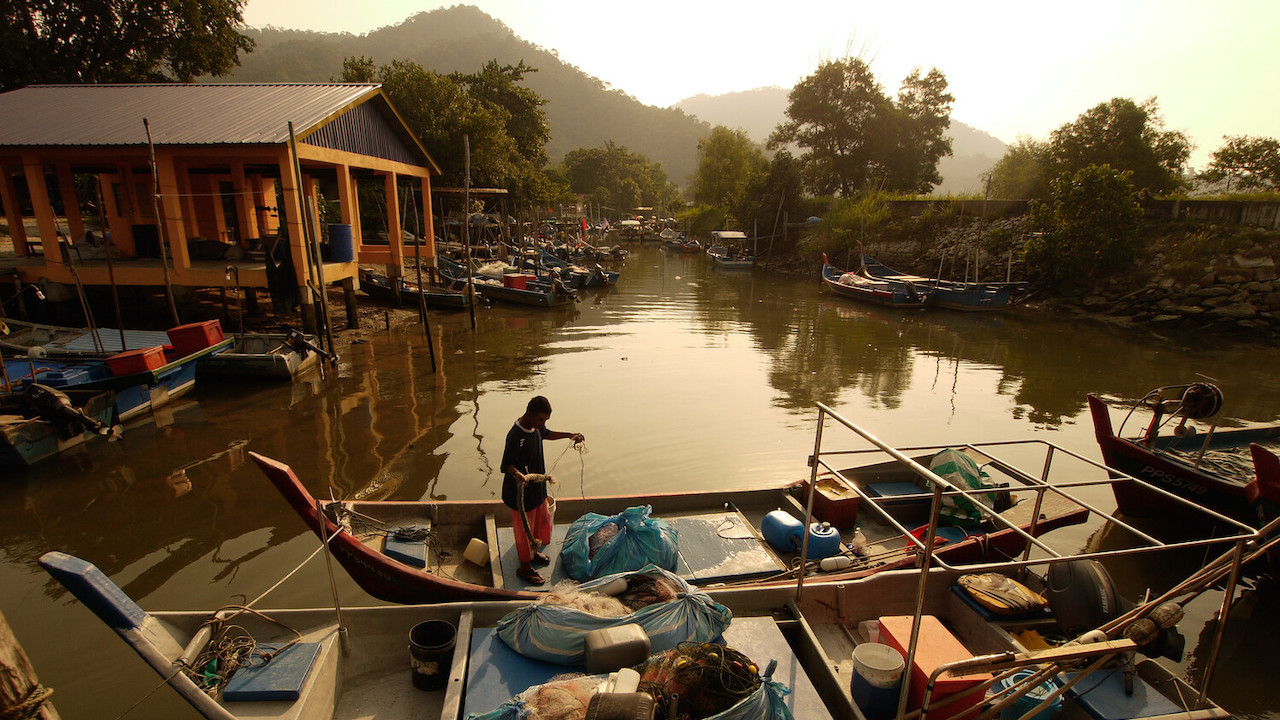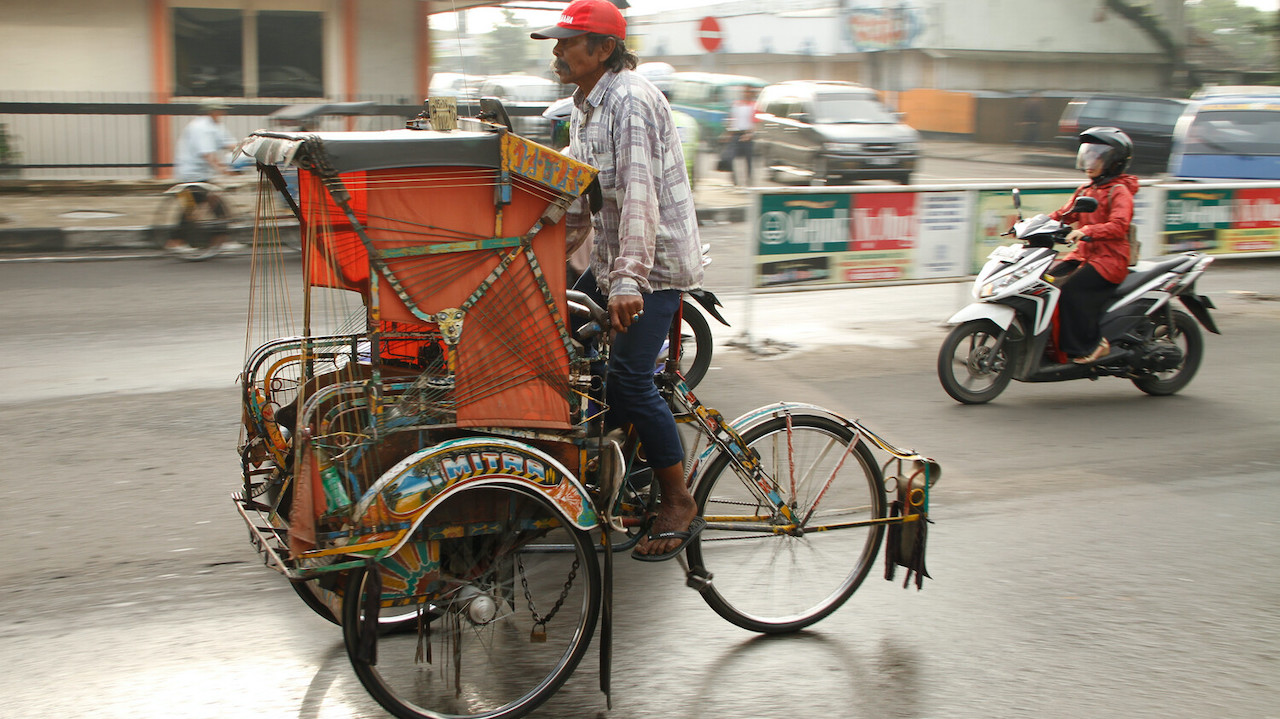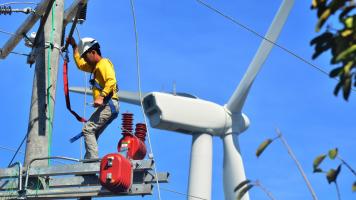
A fisherman tidies up his boat in Teluk Bahan, Penang. Fishing remains a major occupation for many residents of the Malaysian state. Photo credit: ADB.
Local government leaders deploy technology and tap green financing and other innovative approaches to bolster resilience.
Faced with increased rainfall, rising sea levels, and other dangers posed by extreme weather, West Java and Penang are prioritizing measures to address risks from climate change.
Java Island is already experiencing climate-related impacts. Penang faces similar problems. No wonder, since Southeast Asia is considered among the most vulnerable regions to climate change.
Indonesia and Malaysia are among the countries in Southeast Asia that have been more aggressive in pursuing climate adaptation and mitigation initiatives. Indonesia has pledged to reach net-zero carbon emissions by 2060 or sooner, while Malaysia has committed to reduce emissions by 45% by 2030 versus a 2005 baseline.
Political will key to meaningful changes
At the Southeast Asia Development Symposium (SEADS) 2022 plenary panel, “The Future of Sustainable Cities,” West Java Governor Ridwan Kamil said ensuring resilience against climate change and other disruptions like the pandemic takes political will. It is “the most expensive thing” a leader needs to commit to, he said. “You have all the knowledge, you have all the resources, but without political will I don't think there will be a change,” he said, citing Indonesia's net-zero push as proof of leaders’ commitment to implement change.
West Java supports the administration's climate ambition, he said, noting the province now hosts Hyundai’s electric vehicle assembly plant, which aims to supply green cars across Southeast Asia. He also helps prepare his constituents make the switch to renewable energy and reduce dependence on fossil fuels.
Penang State Government Executive Councilor for Infrastructure and Transport Zairil Khir Johari agrees political will is key to achieving meaningful change whether it is about adopting measures to counter climate change or just reducing the use of single-use plastics.
It takes political will for the government to come up with policy changes and “selling” the idea to their citizens, he said. “From what I've seen, people are receptive to good ideas. It’s really how we sell it to them and how we just basically make them understand the narrative of how their lives and their future, the future of their children, can be improved if we make the small changes that we do today.”
Ridwan knows the challenges facing the Indonesian province he oversees comes down to managing the needs of a rising population. He said the issue of building resilient cities relates to the demands of a rising population as it has implications on available resources, jobs, clean water, free education, and other essential services.
He said the key to dealing with disruptions like COVID-19 for instance, is for governments to be proactive and not just rely on assistance. Governments also need to be transparent to avoid risks of unrest and to base their decisions on data.
Collaboration is also key, he said, citing partnerships with the military and police in delivering vaccines in both rural and urban areas helped West Java with its COVID-190 response.
Leveraging on technology
Ridwan also stressed the importance of using technology in making West Java more resilient. He cited how the province deployed a mobile application to distribute medicine to citizens during the pandemic.
Mobile phones are also being used to feed fish in agribusiness operations, he said, referring to a technology developed by an Indonesian startup to help fish and shrimp farms run more efficiently. “The mobile phone is no longer a means of communication, but also a means of production, of economic production.”
Penang in Malaysia is also counting on technology to make the state more livable for residents. Realizing the power of technology to transform, Zairil said the state enhanced its digital infrastructure. As a result, download speeds now average about 35 megabits per second versus 20 megabits per second in 2018.
In 2020, Penang also became the first state in Malaysia to make telecommunications infrastructure a basic utility, essentially putting it on par with electricity and water. Now it is mandatory to include telecommunications infrastructure as part of all new developments.
Also in 2020, the state started an agency called Digital Penang to spearhead the digitalization of government services. As part of its functions, the agency reaches out to the community, particularly older people, to teach them the basics of using a smartphone.
During the lockdowns, the Penang state government even hired young people and those who lost their jobs due to the pandemic and turned them into “an army of digital promoters” who went around teaching people, including SME owners and hawkers, to go digital and how to use online platforms to advertise their products. They also taught people how to use online shopping platforms as well as food delivery apps like Grab.
Tech for Good Institute Chairperson Ilaria Chan also highlighted the role of technology in making cities resilient. She noted how technology can empower people in a lasting away while providing inclusive and equitable opportunities in a scalable way.
Financial services technology, for instance, can boost inclusion and offers a huge opportunity, with many still unbanked or underbanked in Southeast Asia, she said. Fintech can allow providers to offer micro loans or micro insurance to the unbanked.
Tech platforms, like Grab, also provide opportunities for small businesses to sell their products and services online, she said.

Finding novel approaches
Zairil said Penang has become increasingly aware about the impact of climate change, citing average rainfall intensity in the state has gone up six-fold to 180 millimeters an hour from just 31 millimeters an hour in the 1990s. This has led to an increase in flooding in recent decades.
To prepare the state, the local government has come up with the Penang 2030 Agenda, to improve its resilience against climate change. It also formed a task force called the Penang Resilient Infrastructure Task Force, which Zairil chairs, to look into “sustainable urbanism.”
The local government is pursuing all these initiatives with the help of multilateral organizations like the Asian Development Bank (ADB), he said. Recently, Penang also received a grant from the United Nations to run climate adaptation projects to address flash floods and to reduce urban heat.
Over the last 4 years, the state government has spent about $50 million on flood mitigation infrastructure. But it needs more, he said, noting Penang has come up with a model of building new resilient infrastructure that would also serve as a funding mechanism.
To this end, he said Penang is reclaiming three new islands, not just to add real estate and to allow the local government to raise funds for future infrastructure developments, but also as a climate adaptation strategy. The new islands would be built 3 meters above sea level to guard against rising sea levels, high tides, and storm surges.
The islands will also be greenfield developments so they will be fully compliant with environment, social, and governance benchmarks to entice big companies to invest. The first of the three islands will serve as a job center so it is being designed as a green technology park to attract more advanced investments.
Funds raised from the project will finance future infrastructure projects, including a light rail transit system.
Tapping green financing
ADB Southeast Asia Department Director General Ramesh Subramaniam stressed the importance of collaboration and funding in helping cities become more livable.
He said raising funding cannot be done by the public sector or by institutions like ADB alone. “You need to bring the whole ecosystem of players together,” he said.
ADB is bringing public and private sector together in two initiatives. One is through a partnership involving HSBC, Temasek, and Clifford Capital Holdings which set up a debt financing platform to boost commercial development of sustainable infrastructure projects in Asia, with an initial focus on Southeast Asia. ADB will provide technical assistance in terms of identifying the legal regulatory changes that are needed at the city or at the provincial level.
ADB also helps countries make marginally unbankable projects more bankable through a global alliance which pledged $665 million toward a platform that aims to mobilize an additional $7 billion for low-carbon and climate-resilient infrastructure projects in Southeast Asia. The funding was announced at COP26 in Glasgow in November 2021. This builds on the ASEAN Catalytic Green Finance Facility, also managed by ADB, to help countries prepare and finance infrastructure projects that promote environmental sustainability and contribute to climate change goals.
While acknowledging dealing with climate change is a major challenge, Subramaniam is optimistic about the future. “There is a much stronger, much clearer understanding and awareness that cleaner and greener cities are our future. This matters for our children, our children's children, and the future.”

